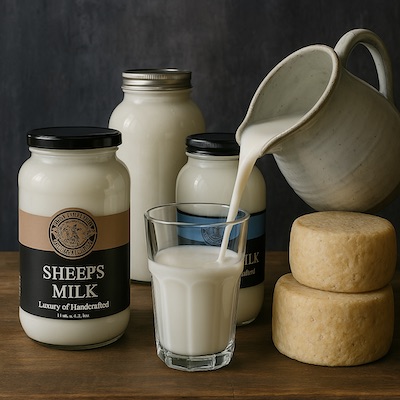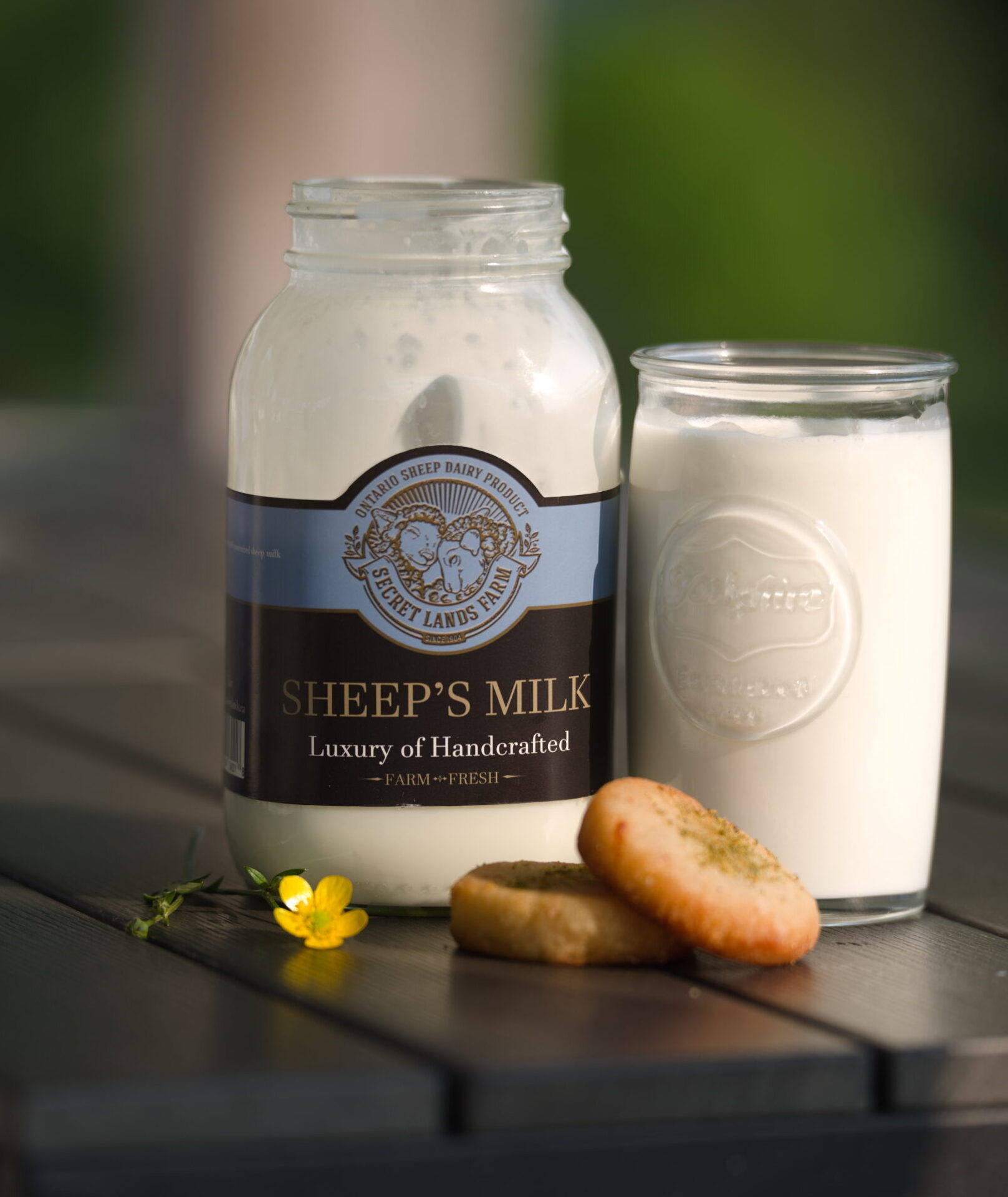Looking for high-quality milk that’s packed with benefits and gentle on the stomach? Natural A2 sheep’s milk might be the answer. This article explores why East Friesian sheep milk, known for its rich, wholesome profile, outshines ordinary milk (even specially produced “A2” cow milk) in nutrition and digestibility. We’ll also examine how traditional sheep milk products, such as kefir, cheese, yogurt, sour cream, butter, and cottage cheese, preserve these benefits. Parents seeking the best milk for their kids, and anyone sensitive to lactose, will learn why sheep milk could be the most beneficial dairy choice in Canada.
Understanding A2 Milk vs. A1 Milk Proteins
Most people are familiar with cow’s milk, but not all milk proteins are the same. “A2” and “A1” refer to types of beta-casein proteins in milk. Regular cow’s milk from breeds like Holsteins contains a mix of A1 and A2 beta-casein. The A1 type can break down during digestion into peptides that may cause inflammation and discomfort in individuals with sensitive reactions. In contrast, A2 beta-casein does not produce those troublesome peptides, making it gentler on digestion.
Natural A2 milk is milk that contains only the A2 type of beta-casein and no A1. Sheep’s milk (and goat’s milk) are naturally A2 milks – these animals lack the A1 protein variant altogether. That means sheep milk is, by default, free of the potentially irritating A1 protein.
A2 protein in cow’s milk
On the other hand, farmers have had to specially breed or select cows to create A2 cows’ milk. If you see “A2 milk” at the grocery store, it comes from cows that have been genetically tested to produce only A2 casein. It’s a step in the right direction for easier digestion, but it’s still cow’s milk at heart. Sheep milk gives you the A2 protein naturally, along with a host of other benefits that we’ll discuss.
Why does A2 vs. A1 matter?
Research has shown that people experience fewer digestive issues when consuming A2-only milk compared to regular A1/A2 milk. In a 2020 New Zealand study of 59 women with lactose intolerance symptoms, those who drank milk containing only A2 beta-casein had significantly less abdominal discomfort and fewer symptoms than when they drank standard cow’s milk. In other words, even though lactose was present in both, the A2 protein milk caused fewer tummy troubles. This is a game-changer for people who think they can’t tolerate dairy. Sheep milk delivers that A2 protein naturally, whereas A2 cow milk is an attempt to mimic this natural gentleness.
Sheep Milk – Naturally A2 and Gentle on the Stomach
Many people avoid dairy due to digestive problems, often attributed to lactose intolerance. Sheep milk offers a gentler experience for sensitive stomachs. Although sheep’s milk does contain lactose (the natural milk sugar), its unique protein and fat structure make it easier to digest for many people. Here’s why sheep milk is often called the “gentle dairy”:
A2 Protein – No Inflammatory Peptides
As mentioned, sheep milk is rich in A2 beta-casein and contains no A1. Common cow’s milk proteins (A1 casein) can release inflammatory compounds during digestion, triggering symptoms like gas and bloating that mimic lactose intolerance. Sheep milk’s A2 protein avoids this issue, so people who get cramps or discomfort from regular milk often feel fine with sheep’s milk. Clinical research supports this gentle effect: in one trial, sheep’s milk caused no increase in digestive symptoms compared to cow’s milk, despite its richer composition. In fact, breath tests showed less hydrogen gas (a byproduct of lactose fermentation) after drinking sheep milk, indicating less lactose malabsorption. For many, the A2 protein makes all the difference.
Naturally Smaller Fat Globules
Sheep’s milk fat is physically different from cow’s milk fat. It’s made of smaller fat globules that are more evenly dispersed (naturally homogenized). Smaller fat particles form a softer curd in the stomach and are broken down faster by enzymes. In comparison, the larger fat globules in cow’s milk can make it sit heavier and longer in your gut. Sheep milk also contains a higher proportion of short- and medium-chain fatty acids, which the body absorbs quickly for energy. The result is quicker digestion and a lower chance of feeling bloated or sluggish after drinking sheep’s milk. Many people who get an upset stomach from a glass of whole cow milk are pleasantly surprised that sheep milk feels lighter.
Fewer Natural Irritants
Aside from lactose or casein, some folks are sensitive to other milk components (like certain whey proteins or trace allergens). Sheep milk has a different protein profile and fewer of these common irritants. It’s not a magic cure for a diagnosed dairy allergy (someone truly allergic to cow casein might still react to sheep casein), but anecdotally, many people who cannot handle cow or even goat dairy thrive on sheep’s milk without issues. It’s often described as a “gentle dairy” option. One New Zealand dairy notes that it takes only about 45 minutes to digest sheep’s milk versus 4 hours for cow’s milk, even when both are pasteurized, due to these structural differences. That means a lower chance of bloating or discomfort after enjoying sheep’s milk or its products.
Bottom line: If you or someone in your family is lactose-sensitive or experiences indigestion with regular milk, switching to sheep’s milk could be life-changing. You get to enjoy real, nutrient-rich milk without the drama in your digestive tract. Of course, individual tolerance varies – someone with severe lactose intolerance should introduce any new dairy cautiously. However, countless people with mild intolerance (or those who assumed they were lactose intolerant) find that sheep milk and sheep dairy products cause no discomfort at all. It’s a natural solution that allows you to keep milk in your diet, rather than eliminating dairy entirely.
Nutritional Powerhouse: East Friesian Sheep Milk Benefits
When it comes to nutrition, sheep milk stands in a league of its own. East Friesian sheep (the breed that we are raising at Secret Lands Farm in Ontario) are famous for producing milk that’s not only abundant but exceptionally rich in proteins, fats, vitamins, and minerals. Choosing sheep milk means you’re getting more beneficial nutrients per glass than standard cow’s milk. Let’s break down the highlights:
High Protein for Growth and Repair
Sheep’s milk is protein-packed. It contains about 5.4–6 grams of protein per 100 mL, nearly double the ~3.3 grams in cow’s milk. To put it practically, one cup (250 mL) of sheep milk provides 13–15 grams of protein, versus ~8 grams in cow’s milk. These proteins are complete, high-quality proteins containing all essential amino acids. More protein means better support for muscle development, tissue repair, and growth, which is critical for growing children, active adults, and seniors maintaining their muscle mass. It’s like nature’s protein shake in a glass.
Healthy Fats & Essential Fatty Acids
Whole sheep’s milk comes with a generous dose of butterfat – typically 6–8% (and up to 10%) fat, compared to ~3.5% in whole cow’s milk. That’s roughly double the fat, but don’t let that scare you. Sheep milk’s fat is packed with “good fats”. It contains more medium-chain triglycerides (MCTs) and short-chain fatty acids, which the body readily uses for energy and metabolism. These fats are less likely to be stored as body fat and more likely to support metabolic health. Sheep milk also contains Conjugated Linoleic Acid (CLA), a unique ruminant fatty acid linked to potential benefits like improved heart health and even anti-cancer properties. Additionally, you’re getting Omega-3 and Omega-6 fatty acids in a favorable balance. The higher fat content in sheep milk also carries fat-soluble vitamins (A, D, E, K) in abundance.
In fact, many traditional diets valued sheep milk and cheese for their ability to provide energy and nutrients – a little goes a long way. Moderation is key, but these richer fats can actually help improve cholesterol ratios and support heart health when part of a balanced diet. And for anyone watching lactose or carbs, it’s worth noting that more fat and protein means a bit lower lactose percentage in sheep milk than in cow’s milk – another reason it tends to be well-tolerated.
Double the Calcium and More Minerals
Stronger bones, here we come! Sheep’s milk is a mineral bomb, especially when it comes to calcium. It contains about 193 mg of calcium per 100g, versus ~120 mg in the same amount of cow’s milk. That’s roughly 1.5–2 times more calcium. One glass of sheep milk can deliver nearly half of an adult’s daily calcium needs, which is fantastic for bone development in kids and bone maintenance in older adults. But calcium isn’t the only mineral where sheep milk shines.
It’s also higher in phosphorus, magnesium, and zinc than cow’s milk. Phosphorus and magnesium work in conjunction with calcium to maintain healthy bones and teeth, while zinc supports immune function and promotes skin health. Sheep milk even provides more iodine (important for thyroid function) than cow milk. Essentially, sheep milk acts as a natural mineral supplement, providing the key nutrients that many people try to obtain from pills or fortified foods, but in a delicious, natural form.
Vitamin-Rich (B12, B2, A, and more)
If you want a vitamin boost, sheep milk delivers. It’s exceptionally rich in B vitamins like B2 (riboflavin) and B12, as well as Vitamin A and Vitamin E. For example, sheep milk often contains 3–4 times more B vitamins than cow’s milk. B2 and B12 are vital for energy metabolism and red blood cell formation, and many people (especially those on plant-based diets) struggle to get enough B12. A cup of sheep milk provides a significant portion of the daily B12 requirement – great news for keeping nerves and blood cells healthy. Vitamin A (in the form of retinol) is higher in sheep milk, too, supporting vision and immune function. With sheep milk, you’re basically drinking a multivitamin along with your protein shake! Even better, when sheep milk is made into cheese or yogurt, these vitamins concentrate, and many fat-soluble vitamins (A, D, E) remain intact.
In summary, sheep milk isn’t just empty calories; it’s nutrient-dense. It gives you more of everything good: protein for growth, healthy fats for energy, and a spectrum of vitamins and minerals for overall wellness.
Unique Nutritional Extras
Beyond the basics, sheep milk has some special components worth mentioning. It contains a high amount of lactoferrin, an immune-boosting protein that exhibits antibacterial and antioxidant properties. Lactoferrin is being studied for its potential role in enhancing immunity and its possible benefits to brain health, as well as its potential to reduce inflammation. Sheep milk has more lactoferrin than cow or goat milk, making it a naturally immune-supportive food.
Sheep milk also contains various bioactive peptides and antioxidants that form during digestion or fermentation, some of which are being researched for health effects (like blood pressure-lowering peptides in fermented sheep dairy). Even the amino acid profile of sheep milk is interesting – it’s high in proline and other amino acids beneficial for joint and gut health. In essence, sheep milk provides not just macronutrients but also functional nutrients that contribute to health in subtle ways. It’s a time-tested food (remember, Roman soldiers carried hard sheep cheese as a vital ration!) that modern research is now validating as exceptionally nourishing.
Take maximum benefits from your dairy
All these nutritional perks make sheep milk an excellent choice for those seeking maximum benefits from dairy. If you’re a parent, you can feel good about giving your child sheep milk or sheep milk yogurt – the extra calcium and B vitamins support bone growth and brain development. If you’re an athlete or a busy professional, the high protein and rich micronutrients in sheep milk can help with recovery and energy. For older adults, the digestibility, combined with bone-friendly minerals, makes it a smart addition to the diet. East Friesian sheep milk, in particular, is prized for its quality.
Secret Lands Farm’s East Friesian flock produces milk that is especially rich in these nutrients (East Friesians are one of the world’s top dairy breeds). We believe sheep milk is the healthiest for human consumption. And it’s easy to see why when you compare it to ordinary cow’s milk. By switching to sheep dairy, you’re upgrading the nutritional value of every spoonful or sip of milk products you enjoy.
Making the Switch and What to Expect
Switching to sheep milk products is easy and rewarding. The taste of sheep milk is often described as clean and slightly sweet, with no “gamey” or strong aftertaste that some associate with goat milk. In fact, many find sheep milk tastier than cow’s milk – it has a luxurious mouthfeel due to the creaminess. Sheep cheeses, such as Pecorino or Caciotta, are renowned for their rich, nutty flavors, and sheep yogurt is exceptionally smooth. So, you’re not sacrificing flavor at all; if anything, you’re elevating it.
Nutritionally, as we’ve outlined, you’ll be getting more of almost everything beneficial. If you start drinking sheep milk or giving it to your family, you might notice you feel fuller for longer (thanks to the high protein). And you’re less likely to need extra snacks. Kids may feel more satisfied after a glass of sheep milk or a sheep-milk yogurt smoothie, compared to the equivalent amount of cow milk, because of that protein and fat content. Over time, you’re also building up your body’s nutrient stores – more calcium for bone strength, more vitamins for immunity, etc. Many people report improved digestion, including less bloating and fewer cramps. And an overall more comfortable feeling after consuming sheep dairy instead of cow dairy.
Enjoying the Benefits of Sheep Milk in Canada
Sheep dairy might sound exotic, but it’s available and growing in Canada – and for good reason. Health-conscious consumers and parents are discovering that natural A2 sheep milk checks all the boxes: easy to digest, loaded with nutrients, and delicious. Secret Lands Farm, based in Ontario, is a great example of how these benefits are being brought to Canadian tables. We operate a family-owned sheep farm and dairy, featuring a pure East Friesian flock renowned for producing high-quality milk. By combining modern food science with traditional techniques, we ensure that the maximum benefits end up in your fridge.
At Secret Lands Farm, the milk is gently pasteurized but not homogenized (since sheep milk is naturally homogeneous). We never alter or standardize the milk’s fat content – it stays as rich as the sheep intended. We also avoid any hormones or unnecessary interventions, keeping the milk as pure as possible. Our philosophy is that healthy, pasture-raised sheep produce the best milk, and the best milk makes the healthiest dairy products. The farm’s sheep roam on pesticide-free pastures and are fed a natural diet (no silage), which contributes to nutrient-dense, clean milk.
Delivering Canada-Wide
For Canadians, this is great news. You don’t have to look overseas for the best sheep dairy – it’s being produced right here in Ontario, with delivery available in many areas. Whether you are a parent seeking a lactose-friendly milk for your kids, a foodie looking for new tastes, or someone with digestive issues who still longs for real dairy, Secret Lands Farm offers a range of options. You can get fresh sheep’s milk (great for drinking or lattes), kefir for a daily probiotic boost, yogurts and sour cream for cooking or snacks, cottage cheese for high-protein diets, and an array of artisan cheeses from soft to aged. All these come from the same superior A2 milk and are handled with care to maintain their nutritional profile.
Summary
Natural A2 sheep milk offers a compelling combination of benefits. It’s gentle on sensitive stomachs, loaded with superior nutrition, and can be enjoyed in a variety of probiotic, lactose-friendly products. East Friesian sheep milk, in particular, exemplifies this richness, earning its reputation as perhaps the healthiest milk for human consumption. For those in Canada, farms like Secret Lands Farm are making it easy to partake in this dairy revolution. We are delivering farm-fresh sheep milk goodness from their pastures to your table. Whether you pour a glass of creamy sheep milk, blend a kefir smoothie, savor a tangy yogurt, or nibble on a piece of aged Pecorino, you’ll be doing your body a favor. You’re not just feeding yourself – you’re nourishing yourself, without the downside that often comes with dairy.
If you’ve been searching for “lactose-free probiotic cheese” or a milk that your dairy-sensitive family can enjoy, give sheep milk a try. It’s a delicious return to how milk should be: pure, wholesome, and naturally beneficial. As Secret Lands Farm proudly puts it, “Traditionally Made. Probiotic Naturally.” – a motto that resonates in every sip of their sheep milk products. The secret is out: natural A2 sheep milk may just be the ultimate dairy choice for health, taste, and digestibility. Your gut, your taste buds, and even your kids might all agree – this is dairy done right.
Resources:
A2 vs A1 Beta‑Casein and Digestive Comfort
- Effects of milk containing only A2 beta‑casein – PubMed Central article comparing A2-only vs A1/A2 milk and its effects on gut symptoms:
https://www.ncbi.nlm.nih.gov/pmc/articles/PMC4818854/ sites.massey.ac.nz+6sciencedirect.com+6frontiersin.org+6frontiersin.org+9pmc.ncbi.nlm.nih.gov+9blog.milkmoovement.com+9 - Systematic Review of A1 vs A2 and gastrointestinal effects – comprehensive review in ScienceDirect on gut response to A2 milk:
https://www.sciencedirect.com/science/article/pii/S2161831322008067 sciencedirect.com+1bonappetit.com+1
Sheep Milk Digestibility & Protein Comfort
- Frontiers in Nutrition – Sheep vs cow milk digestion – clinical trial showing sheep milk causes fewer gut symptoms and less breath hydrogen:
https://www.frontiersin.org/articles/10.3389/fnut.2021.603816/full sciencedirect.com+10frontiersin.org+10sites.massey.ac.nz+10
Bioactive & Immune‑Supporting Components in Sheep Milk
- Importance of Bioactive Substances in Sheep’s Milk – PubMed Central review highlighting lactoferrin, peptides, and probiotics in sheep milk:
https://www.ncbi.nlm.nih.gov/pmc/articles/PMC8122369/ pmc.ncbi.nlm.nih.gov+5pmc.ncbi.nlm.nih.gov+5mdpi.com+5 - Natural Bioactive Compounds in Sheep Milk: Potential Biomedical Use – MDPI review on bioactive peptides (CLA, lactoferrin, anticancer factors):
https://www.mdpi.com/1467-3045/47/6/456 pmc.ncbi.nlm.nih.gov+15mdpi.com+15pmc.ncbi.nlm.nih.gov+15 - Bioactive peptides and lactoferrin anti-inflammatory effects – PubMed review discussing how milk peptides and lactoferrin soothe inflammation:
https://www.ncbi.nlm.nih.gov/pmc/articles/PMC5338169/ pmc.ncbi.nlm.nih.gov




